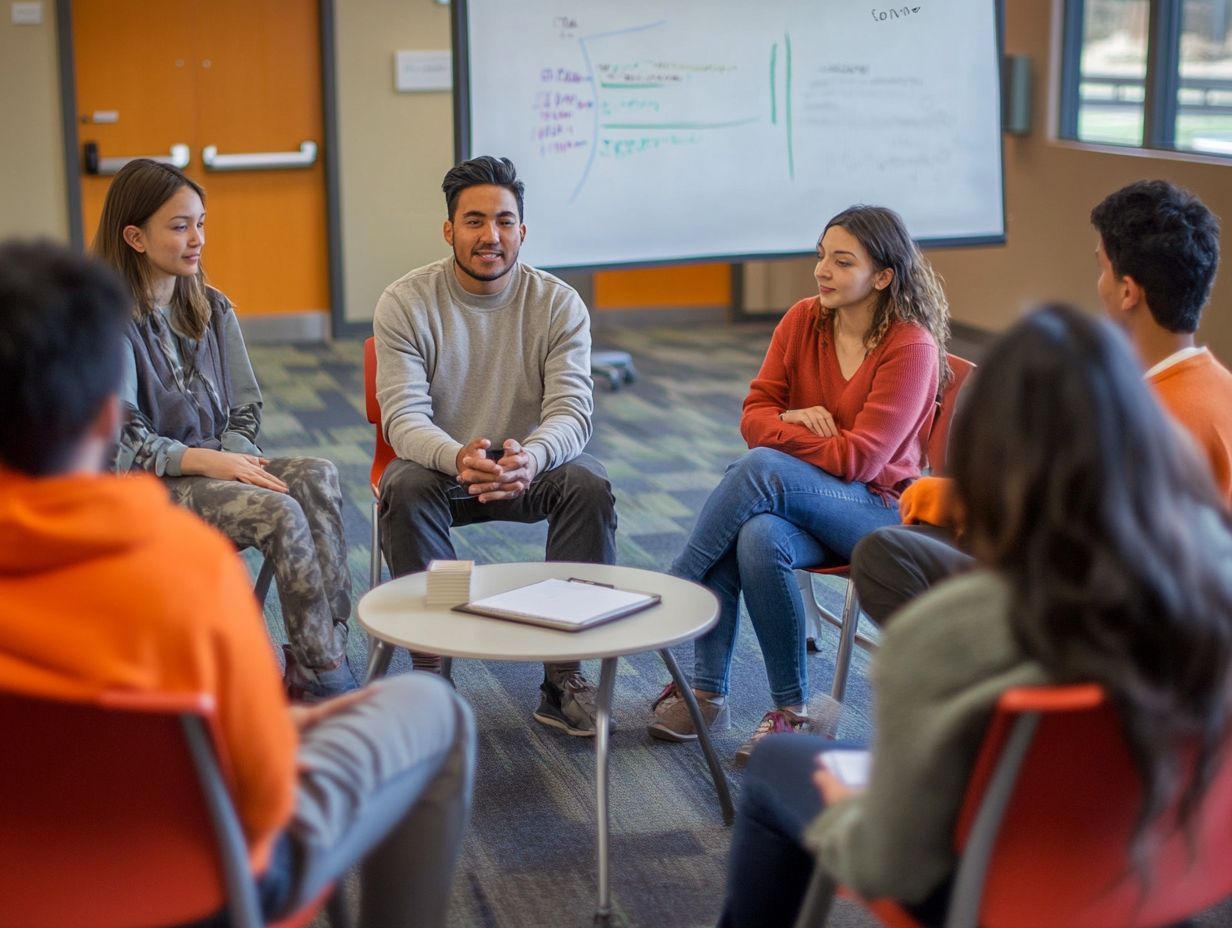the benefits of teaching others what you learn
Don t miss out on the incredible benefits of sharing your knowledge! Sharing knowledge serves as a remarkable catalyst for personal growth and the enrichment of communities.
As you delve into the myriad benefits of imparting your knowledge, you will uncover effective methods for sharing what you’ve learned. You’ll also explore how teaching deepens your own mastery and recognize the profound impact it has on those you teach.
Together, we’ll tackle common challenges encountered in the teaching process. We will provide you with practical strategies to overcome them.
Embark on this journey with us to unveil the transformative power of knowledge sharing.
Contents
- Key Takeaways:
- The Importance of Sharing Knowledge
- Exciting Ways to Teach and Share
- Benefits for the Teacher
- Benefits for the Learner
- Impact on the Community
- Overcoming Challenges in Teaching
- Frequently Asked Questions
- What are the benefits of teaching others what you learn?
- How does teaching others what you learn improve your understanding?
- In what ways does teaching others what you learn benefit those you teach?
- Can teaching others what you learn enhance your communication and leadership skills?
- Is there a difference between teaching and mentoring others?
- Are there any other benefits to teaching others what you learn?
Key Takeaways:

Sharing knowledge benefits both the teacher and the learner by promoting personal growth, understanding, and retention.
Teaching can be done through various methods, such as mentoring, public speaking, and writing. These allow for a diverse range of opportunities to share and learn.
By teaching others, we can contribute to the improvement of society and overcome challenges by addressing common obstacles in teaching.
The Importance of Sharing Knowledge
Sharing knowledge transcends mere altruism; it carries profound implications for both you and the learner.
Research from esteemed institutions such as the University of Pennsylvania, Stanford University, and Vanderbilt University demonstrates that when you teach others, you enhance your cognitive development. You also bolster your memory retention and understanding.
This mutually beneficial relationship creates a richer educational experience. It is fueled by the prot g effect (the idea that teaching helps you learn better), where you find yourself increasingly motivated to learn and address knowledge gaps through the act of peer teaching.
Why Teaching Others is Beneficial
Teaching others is not just beneficial for the learner; it also works wonders for you as the teacher. Engaging in this dynamic process significantly enhances your cognitive development and memory retention.
Your understanding deepens as you explain concepts and share your knowledge. Research backs this up: when you teach your peers, you sharpen your critical thinking skills and gain a more profound grasp of the subject matter.
For example, a study at the University of New South Wales found that students who tutored others retained more information than those who studied solo. The emotional rewards of teaching are hard to ignore.
There s a unique satisfaction that comes from witnessing a learner’s breakthrough or growth, which can elevate your self-esteem and ignite a greater passion for your subject.
These experiences lead to personal fulfillment and help create a more collaborative and enriched learning environment for everyone involved.
You have a wealth of effective learning strategies at your disposal to share what you learn. Whether you’re in a traditional classroom setting or utilizing innovative online platforms like Discord and Zoom, there’s ample opportunity for peer teaching and collaborative learning.
Effective Methods for Teaching and Sharing Information
Effective methods encompass a broad spectrum of techniques, from peer teaching to interactive discussions and the strategic use of technology. These approaches elevate your learning experience.
They cater to diverse learning styles and foster an enriching environment where you feel enabled to engage actively with the material. For instance, when you participate in peer teaching, you explain concepts to your peers, reinforcing your understanding while honing your communication skills.
Interactive discussions leverage platforms like online forums or video conferencing tools, such as Zoom. This allows you to articulate your thoughts clearly and thoughtfully.
Incorporating educational technologies like interactive simulations or gamified learning platforms captures your attention. It transforms the learning process into an engaging and collaborative experience.
Thus, blending various teaching methods and communication styles cultivates a culture of knowledge sharing among learners, enhancing the overall educational journey.
Benefits for the Teacher

Teaching offers exciting benefits that extend beyond the classroom. It provides you with a distinctive opportunity for personal growth, mastery of your subject matter, and the refinement of essential communication skills.
Start sharing your knowledge today and watch the impact it creates!
Personal Growth and Mastery
Engaging in teaching not only cultivates your personal growth but also enables you to master effective learning strategies. Your understanding deepens through the act of instructing others.
This repeated process offers you a unique chance to analyze your methods, address misconceptions, and tailor your approaches to meet the diverse needs of your students.
For example, as you help learners navigate complex concepts, you may uncover gaps in your own knowledge. This prompts you to delve deeper into research and study. This enhanced proficiency boosts your confidence and enriches the learning experience for your students.
When you grow, your students grow, too. Better teaching means better learning!
Benefits for the Learner
For you, the advantages of engaging in peer teaching are substantial. It enhances your understanding and boosts your memory retention.
You also gain emotional rewards from helping others achieve their goals.
Increased Understanding and Retention
Increased understanding and retention are significant advantages you gain from learning by teaching. Research indicates that this process solidifies knowledge in ways that passive learning cannot achieve.
This happens because when you explain concepts to others, you have to organize your thoughts and clarify your own understanding. This often leads to deeper thinking about information.
Studies by Fiorella and Mayer reveal that when you step into the role of a teacher, you engage in explaining things to yourself. This reinforces your knowledge while enhancing your ability to recall information later.
Collaborative learning environments, where peers teach one another, add richness through social interaction that boosts comprehension and retention.
By actively engaging in this teaching role, you re prompted to think critically and creatively, paving the way for a much more profound grasp of the subject matter.
Impact on the Community
The influence of knowledge sharing reaches far beyond the confines of the classroom. It helps society grow by building empathy and patience among individuals within the community.
This exchange of insights enriches personal understanding and strengthens the bonds that connect people, leading to a more compassionate and cohesive society.
Improving Society through Knowledge Sharing

Knowledge sharing holds remarkable potential to elevate society by nurturing empathy and understanding qualities essential for cultivating robust community ties.
When you engage in knowledge sharing, you create an atmosphere where diverse perspectives are not just acknowledged but celebrated. This leads to richer interactions and fruitful collaboration.
Educational psychology underscores the significance of these exchanges, showing how shared learning experiences can enhance both cognitive and social development.
Take community-based programs, for instance. Tutoring initiatives and peer-led workshops let people share skills and ideas. They break down social barriers, creating a sense of belonging.
Likewise, mentoring initiatives aimed at young people often yield impressive results. They boost academic performance and strengthen community bonds. This shows how knowledge sharing strengthens community bonds.
Overcoming Challenges in Teaching
Overcoming challenges in teaching demands a multifaceted approach. It s essential to tackle common obstacles head-on while cultivating empathy and patience in both teachers and learners.
This dual focus enhances the educational experience and nurtures a supportive environment conducive to growth and understanding.
Addressing Common Obstacles
Addressing common obstacles in teaching means recognizing barriers like communication problems and different learning styles. These challenges often arise in classrooms with diverse backgrounds and varying levels of understanding.
To overcome these complexities, adopt different teaching methods tailored to individual learning needs. Creating an empathetic atmosphere helps you connect with your students, encouraging open dialogue.
By improving your communication skills, you foster a more inclusive environment. This promotes active participation and reduces frustration among students.
Frequently Asked Questions
What are the benefits of teaching others what you learn?
Teaching others what you learn offers numerous benefits. It reinforces your understanding and retention of information. You also share valuable knowledge, helping others grow while improving your communication and leadership skills.
How does teaching others what you learn improve your understanding?

When you teach, you explain complex ideas simply. This process forces you to grasp the material fully and identify any gaps in your understanding. Teaching others also allows you to gain new perspectives, further enhancing your grasp of the subject.
In what ways does teaching others what you learn benefit those you teach?
Teaching can greatly benefit those you educate. By sharing your knowledge, you help others learn and develop. This leads to increased confidence, improved problem-solving abilities, and a deeper understanding of the topic. Moreover, it can inspire and motivate them to continue their learning journey.
Can teaching others what you learn enhance your communication and leadership skills?
Absolutely! Teaching requires effective communication and the ability to adapt your style to different learners. It also involves leadership qualities like patience, empathy, and the capability to guide and inspire others. Regular teaching helps you develop these essential skills.
Is there a difference between teaching and mentoring others?
Teaching and mentoring share similarities, as both involve sharing knowledge. However, mentoring focuses on building a more personal, long-term relationship, while teaching is typically about specific subject matter without long-term commitment. Both approaches have unique benefits, so choose based on your goals and preferences.
Are there any other benefits to teaching others what you learn?
Yes, teaching others can enhance your critical thinking and problem-solving skills while boosting your self-esteem and confidence. It also expands your network, opening up opportunities for collaboration and professional growth. Teaching is a rewarding journey that can positively impact others and contribute to societal improvement.





